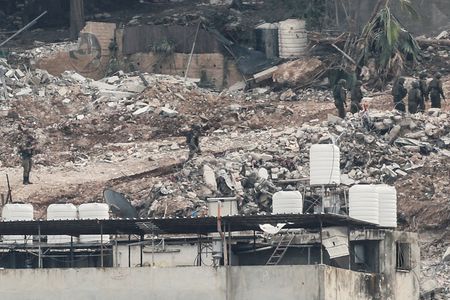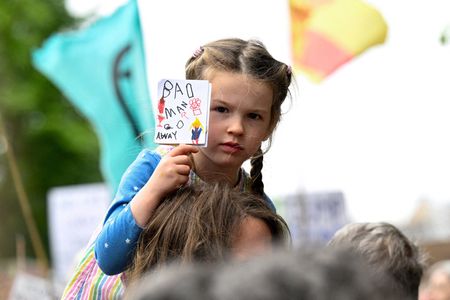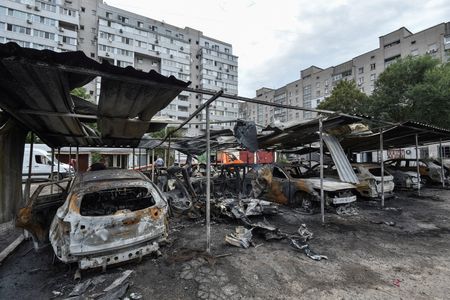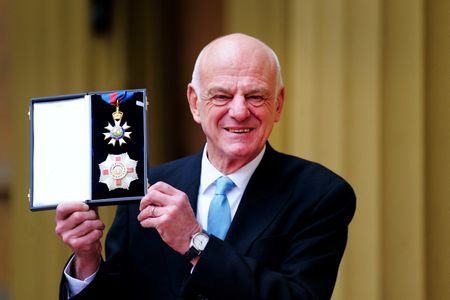By Ali Sawafta
JENIN, West Bank (Reuters) – An Israeli military operation in Jenin has turned the West Bank refugee camp into what residents and some officials describe as a ghost town, causing destruction on a scale not seen there for over 20 years.
Israel’s military says the large-scale raid is aimed at suppressing Iranian-backed militant groups in Jenin, a Palestinian city in the north of the Israeli-occupied West Bank.
Two weeks after the military operation began, Jenin is largely deserted. Thousands of Palestinians have left their homes, taking only what they could carry, after Israel told them to leave through drones with loudspeakers.
After destroying roadways and other infrastructure, Israeli forces demolished multiple buildings at the weekend, causing loud explosions.
“We stayed at home until the drone came to us and started calling for us to evacuate the house and evacuate the neighbourhood because they wanted to carry out an explosion,” said 39-year-old Khalil Huwail, a father of four who left with his family.
“We left in the clothes we were wearing. We couldn’t carry anything, that was forbidden,” he said. “The camp is completely empty.”
After bulldozers and armoured vehicles were deployed near his home, he said, residents trudged away along rubble-strewn roadways to an assembly point where Red Crescent vehicles awaited.
Israel’s military said it had destroyed 23 structures and would “continue to operate to thwart terror wherever necessary.”
From a hillside overlooking the camp, little could be seen apart from clouds of smoke and soldiers moving among the blackened walls of burnt-out houses.
The operation, that latest stage of a raid launched last month, started after a ceasefire began in Israel’s war in the Gaza Strip with the Islamic militant group Hamas.
UNRWA, the UN Palestinian relief agency, said the demolitions in Jenin “undermine the fragile ceasefire reached in Gaza, and risk a new escalation”.
It said Jenin, a township for descendants of Palestinians who fled or were driven from their homes during the 1948 war around the creation of the state of Israel, “has been rendered a ghost town”.
The refugee camp, long been a stronghold of militant groups including Hamas and Islamic Jihad, has been raided repeatedly over the years – not only by Israel’s military but also by the Palestinian Administration.
In 2002, during the Second Intifada uprising, Israeli troops demolished hundreds of houses, displacing about a quarter of its population.
Jenin governor Kamal Abu al-Rub said the latest operation had left in the camp only about 100 people from the 3,490 families that had been there before it.
“The situation is worse than what happened in 2002 because the number of the displaced was lower then,” he told Reuters.
COMPARISONS TO GAZA DESTRUCTION”
Israel has also been sweeping other areas of the West Bank, including the cities of Tubas and Tulkarm.
At the start of the Jenin operation, Defence Minister Israel Katz said the army would apply lessons learned in the war in Gaza, more than 100 km (62 miles) to the south.
“If you didn’t write Jenin camp on the pictures, people would think it’s Gaza,” al-Rub said of the destruction in Jenin. “Same picture, different location.”
An attack on an Israeli military post near Tubas on Tuesday underlined tensions in the West Bank, where hundreds of Palestinians, including armed militants and uninvolved civilians, and dozens of Israelis have been killed since the Gaza war began.
Seventy Palestinians have been killed in the West Bank this year, including 38 in Jenin, the health ministry said.
Israeli officials say the West Bank is part of a multi-front campaign waged by Iran against Israel through proxies such as Hamas in Gaza and Hezbollah in southern Lebanon, and had long said Jenin risked becoming a “mini-Gaza”.
Palestinians see Israel’s operation, which began after Israel banned UNRWA from its headquarters in East Jerusalem, as an attempt to displace Palestinians from land they see as the core of a future state in a repeat of events in 1948 that they call the “Nakba”, or catastrophe.
Nabil Abu Rudeineh, spokesperson for the Palestinian presidency, called the operation part of a wider effort aimed at “displacing citizens and ethnic cleansing” that had gained new focus since U.S. President Donald Trump – who was due to meet Israeli Prime Minister Benjamin Netanyahu on Tuesday – suggested Egypt and Jordan should take in Palestinians.
Jenin residents forced out of the camp remain defiant.
“We will go back to our homes, the Nakba will not return,” said Khalil Huwail. “We will not migrate to another area.”
(Writing by James Mackenzie, Editing by Timothy Heritage)









